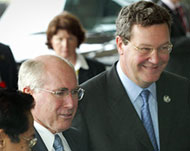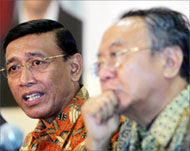Tsunami could bring peace to Aceh
The tsunami that crashed on to the shores of Aceh, Indonesia, could lead to improved relations between Western powers and the local Muslim population.

It could also weaken the armed separatist Free Aceh Movement (GAM), the minister responsible for coordinating disaster relief has said.
“There is a unique opportunity for the Indonesian government to solve issues in Aceh and begin the peace process, and to solve problems with radicals as well,” says Alwi Shihab, Coordinating Minister for People’s Welfare and the overall chief of relief efforts in Aceh.
“We can point to American and Australian efforts and say to the radicals: ‘See, they have come here with noble intentions to help the Muslim people of Aceh.’ And we can turn to the Acehnese people and GAM and say: ‘Look, the population of Indonesia is behind the people of Aceh’.”
Hundreds of members of hardline Java-based organisations, some of them virulently anti-West, have arrived in Aceh since the earthquake and tsunami.
Working together
Pitching in to deliver aid, they have been forced to work for the first time with foreign humanitarian organisations and the US military, whose navy has taken the lead role in delivering humanitarian assistance.
 |
|
Australian Prime Minister John |
“There will be the perception among some people that the foreigners are here to convert Acehnese people to Christianity and that could be a serious problem,” says senior Acehnese cleric Muslim Ibrahim.
“I know this is not the case, but we must work together with these foreign NGOs (non-governmental organisations) and move slowly to ensure there is no misunderstanding.”
Others, such as the Pemuda Panca Marga, are arch-nationalist militias with a history of attacking groups critical of the Indonesian military.
Civil war
Aceh province is the scene of a protracted civil war between roughly 5000 separatist rebels called the Free Aceh Movement (GAM) and the Indonesian military. In the past few years, the army has cultivated close contacts with the Javanese minority in some parts of the province, supporting their efforts to form village “self-defence” militias in areas with a strong GAM presence. The rebels have attacked those villages in the past.
 |
|
Indonesian soldiers load supplies |
Support for GAM varies among the population but most Acehnese feel they have been exploited by the Jakarta-based government, which has made immense profits from the resource-rich province while providing few of the benefits of membership in the republic.
Despite lucrative gold deposits, timber, fish and reserves of natural gas and petroleum products, Aceh’s infrastructure is crumbling, its roads remain in poor shape, electrical service is erratic in many places outside the capital and schools and hospitals are poorly equipped.
Human rights
The effects of the disaster and the arrival of a sizable contingent of foreigners have emboldened human rights activists, who are routinely jailed and intimidated by the Indonesian security forces.
“It is much more difficult for the military to operate since the tsunami, so we do not fear them so much,” says Teuku Ardiansyah, head of the Acehnese Forum for Non-Governmental Organisations. “The funny thing is that now the local government is calling us asking for help.”
The Acehnese remain deeply scarred by the nine-year-long military operation that ended in 1998 with the ousting of the Indonesian leader Suharto.
Erratic rule
The following year, then-chief of the armed forces General Wiranto publicly apologised to the Acehnese for offences committed by soldiers during the period of occupation. A government human rights commission concluded 10,000 civilians died during the period, a similar number of women were raped and hundreds were tortured or disappeared.
 |
|
Wiranto (L) apologised for |
Separatist fervour was stirred in November 2000, when Abdurrahman Wahid, the first leader of the post-Suharto era, promised the Acehnese a referendum on independence.
In the first of what came to be a pattern of erratic behaviour that marked his presidency, Wahid reversed his position a week later, saying that implementation of Islamic law (al-Sharia) was up for discussion but the province itself would remain part of Indonesia. Sweeping military operations began almost immediately and GAM vowed to continue the armed struggle.
Hope
The first glimpse of a possible solution to the well-entrenched 29-year-long struggle came in 2002, when the government, under pressure from the West, agreed to direct negotiations with GAM. For the TNI, still smarting from what it sees as a political decision in 1999 to hand the hard-fought-for former province East Timor its independence, it was a humiliating experience.
“The feeling within the Indonesian military is that every time you talk, the rebels win,” says Sidney Jones, who has written extensively about the TNI.
“Since East Timor, the military has made Aceh a key issue, a line in the sand they will not cross. It is Aceh and Papua that represent the key issues in their defence of the territorial integrity of the Republic of Indonesia.”
Aceh has been closed to outside eyes since May 2003, when peace talks broke down. Security forces jailed the GAM negotiators who had been promised immunity in exchange for their involvement in the talks, declared a military state of emergency in Aceh and launched its largest military operation since the invasion of East Timor in 1975.
Some activists say the arrival of hundreds of journalists, aid workers and diplomats since 26 December offers a small window of opportunity to restart negotiations with GAM and perhaps ensure a lasting peace.
“I believe there is an opportunity to re-open the dialogue between RI (Republic of Indonesia) and GAM,” says human rights lawyer Rufriadi.
“I am optimistic for the first time in years that we will see peace in Aceh but it must happen quickly. If the government does not step up and take the lead, then I believe the chance for peace in Aceh will be lost forever.”